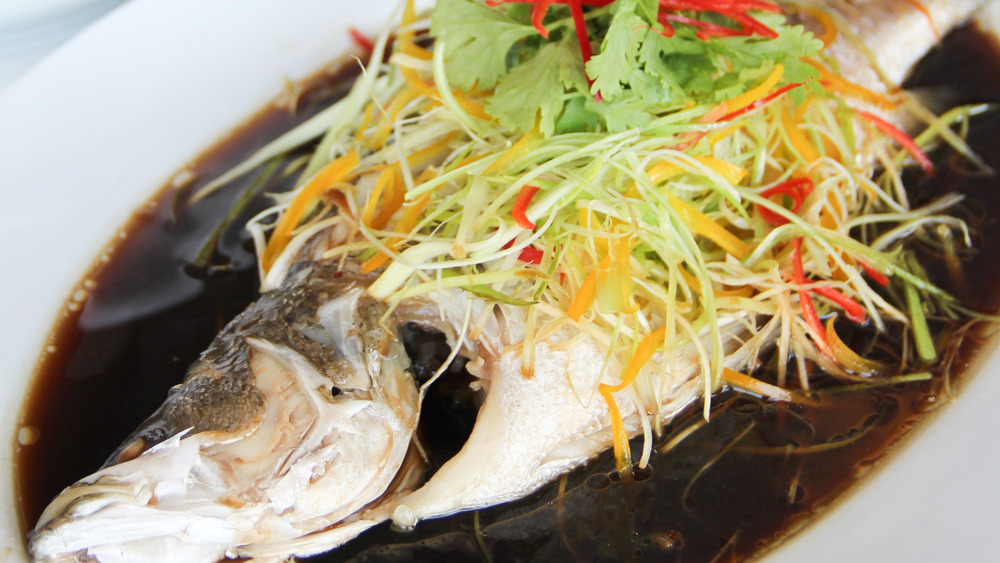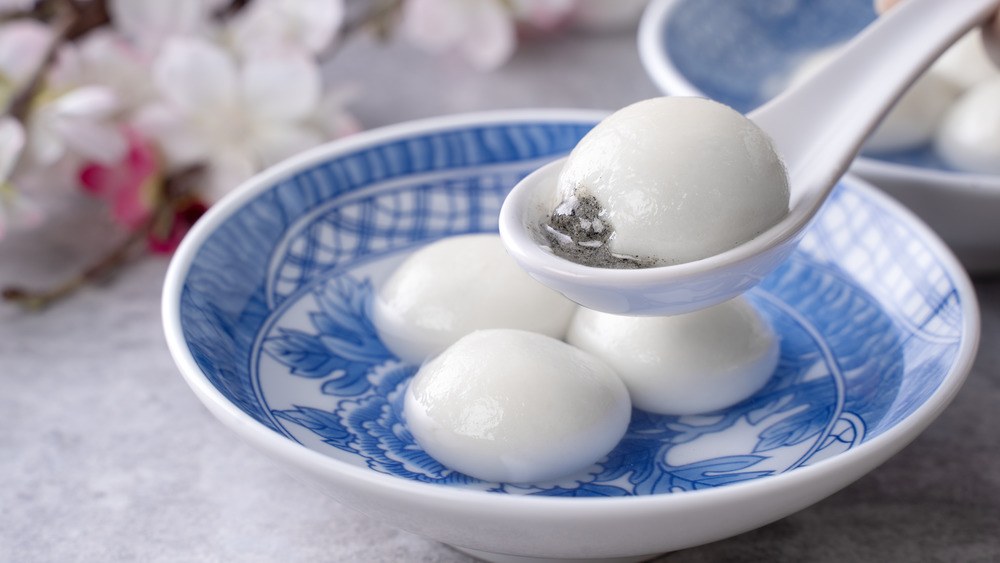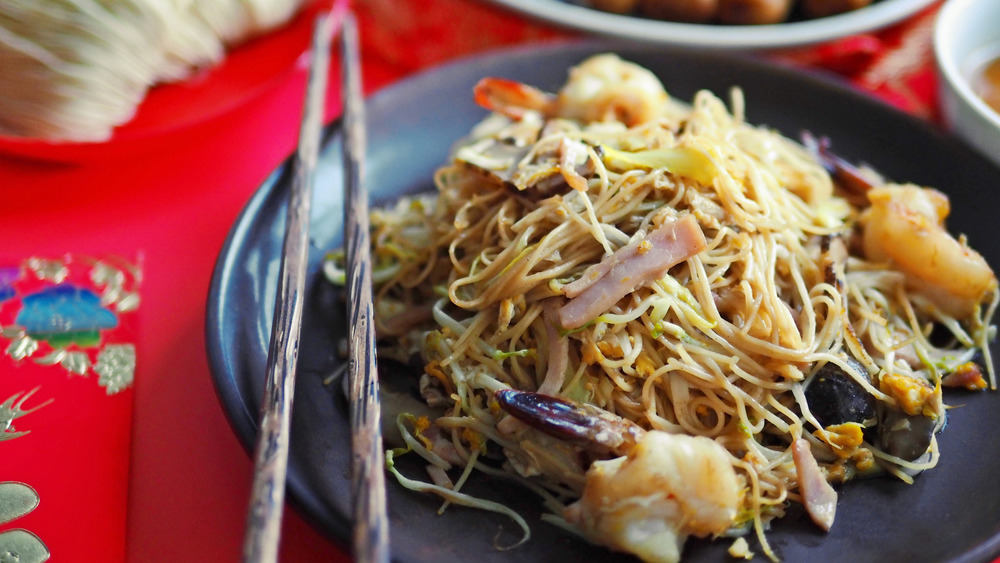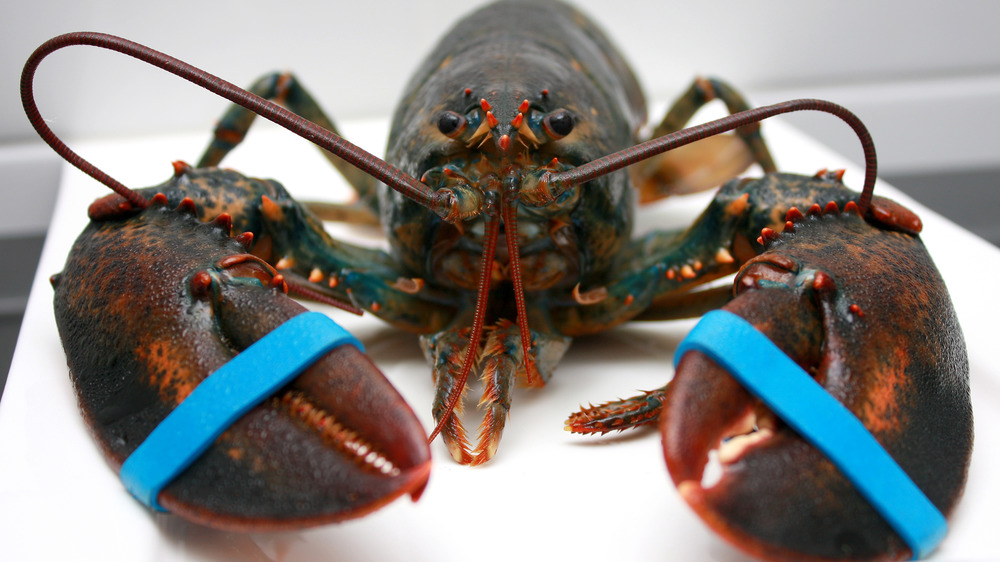You Should Eat These Foods On Lunar New Year To Bring Wealth
Lunar New Year is one of the biggest holidays on the planet, celebrated by some 1.5 billion people, per ET. Although in the U.S. we often incorrectly refer to it as Chinese New Year, it's also a huge holiday in numerous Asian countries including Vietnam, Mongolia, and South Korea (it's also observed — although not always in a healthy way — by some in North Korea). The "Lunar" part of the name refers to the fact that it's a floating holiday, much like Easter, and is timed to occur on the first new moon occurring on or after Jan. 21. This year Lunar New Year begins on Feb. 12, although China Highlights notes that in that country, at least, the festivities go on for 15 days.
No matter your ethnic origin, you're welcome to celebrate Lunar New Year, as new beginnings, fresh starts, and the (eventual) arrival of spring are themes that resonate with all of us. While some traditions (such as ritual house cleaning) may not be something everyone's going to want to jump on board with, there's one part of Lunar New Year that everyone's sure to enjoy: an excuse to feast on all manner of delicious foods! Not just because it's party time, but because each one of these foods has a special significance and eating it is sure to bring some form of luck in the coming year.
These foods are said to make you wealthy
The largest category of lucky foods that are to be eaten on Lunar New Year, seems to be those said to bring you prosperity. Travel China Guide says that dumplings symbolize riches due to the fact that they're thought to resemble gold ingots, and they are also a traditional holiday food as the name "jiaozi" means "changing of years." Spring rolls are also said to bring wealth as well as a fresh start, while glutinous rice cakes can bring an always-welcome pay raise.
Yet another food that features prominently on many a Lunar New Year's menu is fish, since the Chinese word for fish is "Yú," something that sounds similar to the word for "surplus." China Highlights says that some families will choose to eat two fish, one on New Year's Eve and the other on New Year's Day. This is said to bring a surplus of good things year after year. How the fish is served is important, too. It must be cooked whole, complete with head, and the head is to face any elders or distinguished guests who may be present as it is a sign of respect. The person(s) who are seated at the head of the fish, should also take a bite of it first before others enjoy their fish.
Eat these foods if you want a happy family
Lunar New Year is, above all things, a family festival, much as Thanksgiving is in the U.S. In fact, according to SupChina, the New Year's festivities might be the only time of the year when many far-flung Chinese families are able to be together. A whole chicken (whole meaning with head and feet still attached) represents family togetherness, and in some places, certain lucky breadwinners get first crack at the chicken feet since these are supposed to help them "grasp on" to even more bread, er, money.
Other foods said to symbolize a united family are ones that are round in shape. Tangerines and oranges are actually a two-fer, as they have this lucky shape, and their color is also said to be reminiscent of gold so they're also symbolic of wealth. Yet another round, family harmony-promoting food is sweet rice balls. China Highlights says these are usually eaten during the Lantern Festival that marks the end of the New Year's festivities, but that in southern China they are eaten throughout the entire festival.
These dishes may grant you a long life
While everyone wants a happy family and a lot of money never hurts, neither one will do you much good if you don't live long enough to enjoy them. Asian cultures have traditionally been extremely respectful of their elders, so it stands to reason that most would like to attain that status themselves (none of this "live fast, die young" nonsense). To that end, one food that is an absolute must for every Lunar New Year celebration is longevity noodles, or chángshòu miàn according to SupChina. The longer the noodle, the longer the life, although you'll need to do your best to suck them down whole without chewing since otherwise they might not be so lucky.
Medium relates that there's a Korean counterpart to this dish called Ddeokguk, which is a soup made from rice cakes (there's also a dumpling version called manduguk). This soup symbolizes good health and a long life, two things that often go hand in hand (go figure). Should anyone ask you how many bowls of it you've eaten, it's meant to be a cute way of asking how old you are, since presumably you'll have eaten a bowl during every New Year's celebration of your life.
You may want to avoid these foods
While Lunar New Year food traditions are mostly about "do" rather than "do not," China Highlights does list a few food taboos that should be observed. One of these may be no real hardship: on New Year's Day, no porridge is to be eaten. The reason behind this ban is due to the fact that porridge has traditionally been seen as poor folks' food, so breakfasting on overnight oats could be a bad omen that brings poverty in the coming year. You'll also have to pass on bacon or sausage for your morning meal, since no meat is to be eaten at that time. This is a gesture of respect to the Buddhist deities, all of whom are opposed to killing. They're not too demanding, though, so they will permit meat later in the day.
Throughout the entire 15 days of the Lunar New Year's season, there is one kind of food you'll need to avoid eating, or at least preparing. Anything alive before you cook it is a no-no, so skip the live lobsters. Those same tolerant deities, who allow meat during the New Year's celebrations (except for that one breakfast) would at least like you to refrain from engaging in any actual killing yourself for the duration of the festival. No word on whether they include live bacteria under that same prohibition, but you might want to pass on any probiotics just in case.




